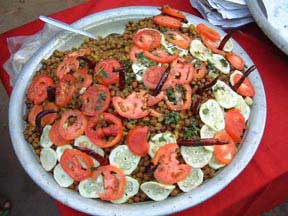|
Every culture has its tradition of fasting and feasting. For Muslims that tradition falls in October, the holy month of Ramadan during which they pray and fast daily, culminating in the joyous festival of Eid-el-Fitr on the sighting of the new moon during the first week of November.
The Ramadan fast is a strict regimen; believers try to avoid even a sip of water. Muslims fast from dawn to dusk for the month of Ramadan, breaking their fast in the evening when the Azaan is called, with Iftiar, the breaking the fast meal. Walk down Jackson Heights, NY, or Decatur, GA , and you see the bustle of the festive crowd, shopping for groceries, clothes and bangles. If you’re around during the evening hour, you’ll be able to catch the fast-breaking tradition at restaurants like Sheereen Mahal, Shaheen or Kabab King. These are particularly popular with cab drivers, who stop by to greet each other and break the fast together. At Khaamar Baari, a store cum restaurant, you could pick up pre-packaged Iftiar boxes for $6.99 for take-out. At Kabab King, which is open 24 hours, Iftiar time is an amazing sight, with hundreds sitting down for a meal after fasting all day. At Kabab King, Abdul Razak explained that the menus change daily, but they often offer pakoras, vegetable samosas, kebabs, rooh afza (a drink) and sweets to break the fast. Dinner includes biryani, chicken korma, tandoori fish and other delicacies. The mosques and community centers organize free Iftiars for the community, but sometimes even restaurants chip in. Robina Niaz, who lives in Queens, recalls, “I have walked into restaurants during Iftar and they have offered me samosas and dates to break my fast with. I think it’s just such a moving gesture.”
During Ramadan the regular routine of work continues, but there is a special focus on prayer. Says Niaz: “The special thing during Ramadan is waking up in the morning, a couple of hours before sunrise for Sehri, preparing a pre-dawn meal and having it and then doing prayers. “The whole idea of breaking your sleep to wake up for the sake of fasting and for Allah – it’s a very special thing we do all of Ramadan. You know, if you asked me to wake up at 4.30 a.m. at any other time of the year, I’m not a morning person and it would kill me! But during Ramadan, it comes naturally.”
After waking up in the dark at 4.30 a.m, believers have a cup of tea and a meal and then wait for the Azaan, or call to prayer, one hour before sunrise. It’s a very spiritual occasion and in these troubled times, Niaz says, a new trend is interfaith Iftars. Niaz celebrated at an Iftiar organized at St. Pauls Andrews Church in Manhattan: “That was the day of Yom Kippur when the Jews, Muslims, Hindus and the Christians came together and the Christian pastor’s wife cooked a meal for everybody. The Jews were breaking fast one hour after we did, so they had brought their special breads, dates and almonds for us to break our fast, and we joined them in fast-breaking an hour later and it was just the most beautiful thing.” After the month of fasting and the sighting of the crescent moon, Eid-el-Fitr is celebrated. The lavish feast can include everything from chicken korma, biryani and kababs to halwa puri, different kinds of fruit chaats and alu chole. But the most typical delicacy is saviyan, very fine vermicelli cooked in milk in almost a dozen different ways, the most favorite form being sheer korma. Recalls Niaz: “My brothers and father would come back from the masjid and there would be a big bowl of saviyan sitting on the table. There hasn’t been one Eid in my entire life when there wasn’t saviyan in the morning when we finished our prayers and were ready to greet each other.” |
Eating Out: Fasting And Feast

